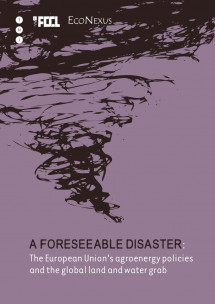Ideas into movement
Boost TNI's work
50 years. Hundreds of social struggles. Countless ideas turned into movement.
Support us as we celebrate our 50th anniversary in 2024.

Why despite ten years of accumulating evidence on the social and environmental cost of agrofuels, does the European Commission persist with its failed policies? An analysis of the EU's bioeconomy vision, how it is fuelling land grabs in Africa, the agrofuels lobby that drives policy, and the alternative visions for energy that are being ignored.

Shortly before the new millennium began, the EU embarked upon a major agroenergy and bioeconomy experiment. The EU began with agrofuel as the first major step toward an envisioned overall shift: from fossil resources to agromass as a source not just of energy and fuel, but also of food, feed, fibre and chemicals. This is the so-called ‘bioeconomy’ — and it is the leading technological version of the ‘green economy’ regime first promoted by the United Nations Environment Programme (UNEP) and the Rio+20 process.
More than ten years into this experiment, the evidence from science, academia, and grassroots voices is emerging ever more clearly: most of the claims initially made for agroenergy as a genuinely renewable alternative to fossil fuels are flawed.
Life cycle assessments of agrofuel greenhouse gas emissions that include the effects of indirect land use change show that the supposed emissions savings claimed for agrofuels are greatly overestimated; and when all impacts are considered, they are generally worse than the fossil fuels they replace. Meanwhile, the creation of an EU market for industrial agrofuels has been shown to have a negative impact on the land and resource rights, livelihoods, and food security of local populations, especially in the global South. These same concerns hold true for agromass.
Despite the accumulating evidence, however, the European Commission (EC) is persisting with its agroenergy policies, resolutely refusing to change targets that were demanded by industry from the outset to provide security of investment in the sector. Rather than heed the evidence, the EC has instead responded to criticism with a combination of measures that many observers regard as wholly inadequate, since they rely on voluntary adherence to sustainability criteria and on as yet unrealised (and unrealistic) ‘advanced’ technologies such as second-generation agrofuels, among others.
Today we are at a critical juncture. The two directives which are the cornerstones of the EU agrofuels policy – the Renewable Energy Directive (RED) and the Fuel Quality Directive – are beginning their bi-annual review processes, and post-2020 policy and targets are already being formulated. At the same time, and apparently without reference to the unfolding failure of agrofuels, EU incentives and support for biomass is steadily rising. In this context, it is essential that these agroenergy policies and their underlying assumptions continue to be challenged.
By critically analysing the origins, claims, and effects of the European Union’s (EU) transition to a new bioeconomy, this report aims to contribute to challenging this strategy. A central part of the discussion focuses on the failure of the EU’s agrofuels policies to deliver the low-carbon, sustainable, and pro-rural development outcomes envisaged for them. It highlights ways in which EU policy is contributing to a reordering of land and land use especially in Africa.
Behind all the EC’s assumptions, claims and evasions regarding agrofuels and agromass, lies an extremely powerful industrial lobby that includes the motor industry, the oil industry and the various energy industries. The report will therefore also examine how the constellation of forces that make up the agroenergy lobby have managed to steer EU policy to their benefit. This agroenergy lobby has been able to succeed due to their alignment with the EU’s grand plan for a bioeconomy,understood here as a managerial project based on the capitalistic appropriation and conversion of renewable biological resources to facilitate a market-based, techno-centric response to unsustainable energy patterns.
More generally, the EU sees in its promotion of the bioeconomy a chance to secure a global leadership role. Yet in presenting the bioeconomy as the ultimate win-win strategy, the EU is closing the door to genuine alternatives and much bolder policy decisions to reduce energy consumption and prioritise the exploration of a less energy dense development path for Europe. Only by tackling this overarching narrative can the EU’s policy lock-in with respect to agrofuels and agromass be overcome.
Photo: Tom Pietrasik/ActionAid